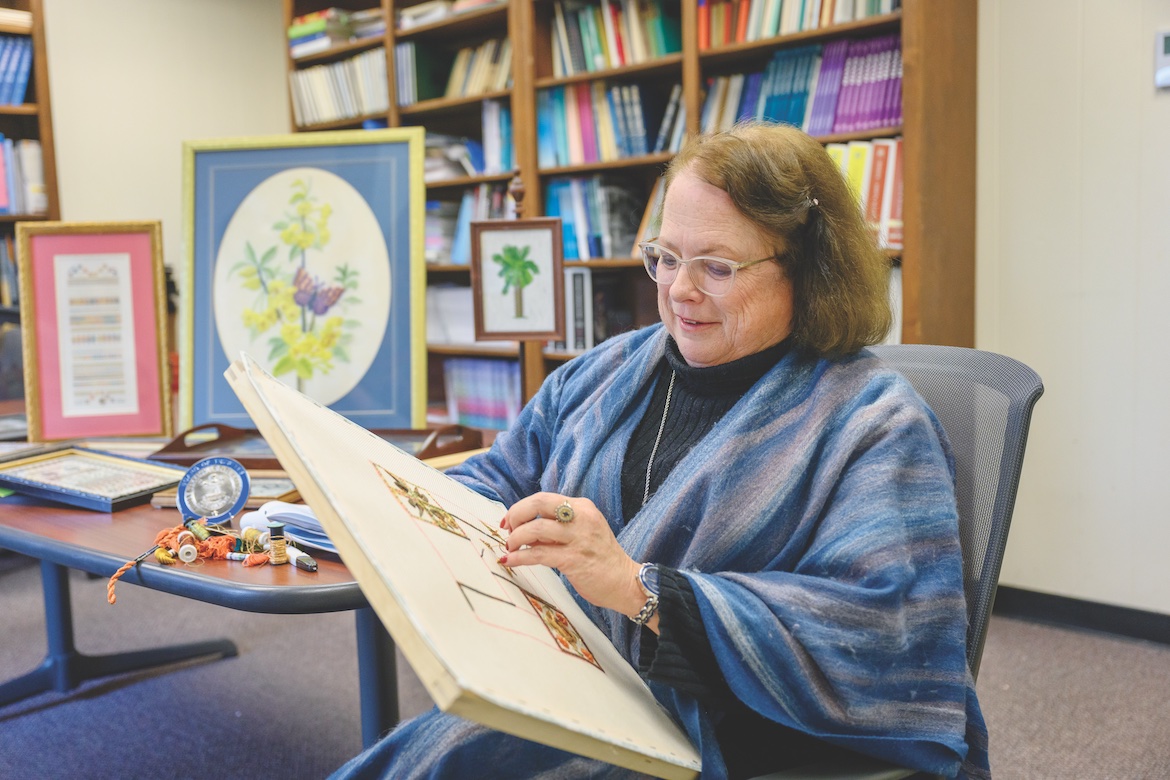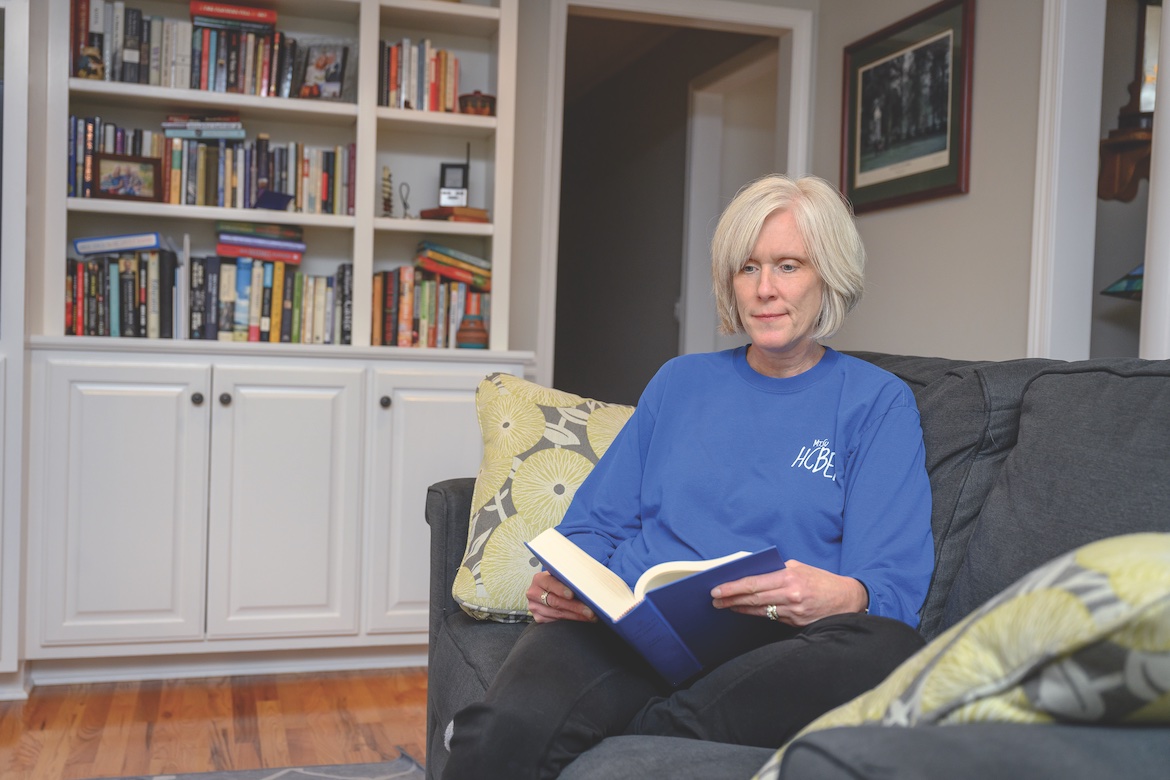
1 minute read
Taking Stock
Top-funded faculty grab the gold for groundbreaking grant projects
As a publicly supported institution of higher learning, MTSU takes its role to serve the state of Tennessee very seriously. That includes conducting research and creative activities that produce knowledge, information, data, technologies, know-how, and other outcomes that are disseminated from MTSU to the whole state to help improve the economy, services, and quality of life for all Tennesseans.
In 2022, MTSU celebrated its advancement to an R2 high research activity doctoral university designation by the Carnegie Classification of Institutions of Higher Education. This elite status places the University among a select group of only 3% of institutions nationwide to earn the R2 designation. Each R2 university has a unique group of folks who, over their careers, bring a substantial amount of grant and contract dollars to the institution in support of their research, teaching, and service. These dollars help facilitate the university’s mission of research, teaching, and service, and they help the bottom line, adding to the traditional revenue streams of tuition and state funding.
The following seven individuals have achieved the distinction of bringing more than $5 million in grants and contracts to MTSU over their careers at the University.
HEART OF GOLD
Center for Health and Human Services director Cynthia Chafin turns project expertise into life-changing results

After graduating from MTSU with her Business Administration degree, Cynthia Chafin (’88) spent the first five years out of college as an accountant.
“I did okay with it, but something was missing,” she said of her first professional experience. “I figured out I’ve always been personally passionate about any kind of health-related topic.”
She enrolled at Vanderbilt University and obtained a graduate degree in health promotion and education, then started working with the Tennessee Department of Health.
I really felt like I was making a difference with people,” she said. “That was my motivation and continues to be my motivation.
Chafin later had a chance meeting with Martha Jo Edwards, who then held the Adams Chair of Excellence in Health Care Services at MTSU. Edwards asked her to help administer a grant. It marked Chafin’s return to her alma mater, working in MTSU’s Center for Health and Human Services (CHHS) as a project director.
CHHS collaborates with agencies and nonprofits to improve the well-being of Tennesseans through training, research, communication, and education. The center’s reach is national, with activities currently in an 11-state area.
That first project Chafin worked on at MTSU was a tobacco cessation program focused on low-income women who were pregnant, smoked, and used Health Department services.
In 2002, when CHHS launched Smart Mothers Are Resisting Tobacco (SMART Moms), Tennessee had the second-highest maternal smoking rate in the nation. More than 29% of the state’s pregnant recipients in the Women, Infants, and Children nutrition supplement program smoked.
Under Chafin’s guidance, SMART Moms became operational in public health agencies in all 95 counties in Tennessee.
In all, more than 13,000 pregnant women received one-onone counseling with a provider that Chafin’s team trained. The result? Of the enrollees, more than 24% stopped smoking, far exceeding both the 14% success rate of similar programs and the goal of 10%.
“Every health department in the state continues to offer pregnant women a special program to help them quit smoking,” Chafin said. “That is something we can be proud of at MTSU.”
Such early success in the field bolstered Chafin’s decision to use her administrative strengths and passion for health care to improve public health through large grant-funded projects.
For instance, CHHS and a nonprofit coalition recently partnered to address opioid misuse in Wilson County's rural communities thanks to a $1 million federal grant.
It’s just one of many recent projects CHHS has administered that are making a difference.
Read a longer version of this profile in the 2023 MTSU Research magazine.
— Drew Ruble
SINGING PRAISES
Choral director Raphael Bundage pours a lifetime of experience into opening doors for young artists

For Raphael Bundage, an MTSU professor in the School of Music, director of choral activities, and longtime director of the Tennessee Governor’s School for the Arts, music began as a family affair.
Bundage’s father, a Methodist (AME) minister (who also taught college chemistry), sang bass in a high school quartet. His mother, an English teacher, was a wonderful singer. One of his sisters sang opera. Another played violin. His brother played trumpet. Even his paternal grandmother played guitar.
Music, as the expression goes, was in his blood. His direction in life was clear. One visceral memory Bundage has of the family piano perhaps best exemplifies this passion.
As a kid, I would gnaw at the keyboard,” Bundage said. “There were teeth marks on the piano. I so wanted to be close to the music.
Bundage’s earliest taste of conducting came in high school when he conducted a vocal ensemble of 14 high school singers called the Songmates. Accepted to Texas Christian University’s School of Music, Bundage got to conduct choral ensembles, including the prestigious TCU A Cappella Choir.
While at TCU, Bundage also performed in the pep band for the Dallas Cowboys. Bundage played clarinet and tenor saxophone but wasn’t much of a football fan, admitting he brought a book to the games to read between songs.
Bundage later served as director of the Eastman Chamber Chorus and assistant director of the Eastman-Rochester Symphony Chorus while earning his master's and doctorate at the Eastman Conservatory of Music in New York.
Bundage’s professional career began as a supervisor of choral music in the Texas public school system. A few years later, in 1985, he came to MTSU as a professor in the School of Music. He became chorus master of the Nashville Opera Association and Nashville Symphony Chorus, conducting choruses for several seasons under the late maestro Kenneth Schermerhorn.
Bundage’s various MTSU choral ensembles have toured extensively throughout the U.S. and Europe, performing in such places as composer Wolfgang Amadeus Mozart’s home church, the Vatican, and Carnegie Hall.
Such a storied background made him the perfect fit to direct one of MTSU’s most prestigious—and lucrative— grant programs.
For more than a decade, from 2010 to 2021, Bundage served as the primary investigator on the nearly half-million-dollar annual Tennessee Governor’s School for the Arts grant—and served as the program’s director.
The pre-professional summer curriculum includes individual and group instruction designed to help rising 11th- and 12th-grade gifted students explore and develop talents in music, ballet, theater, filmmaking, or visual arts.
Read a longer version of this article in the 2023 MTSU Research magazine.
— Skip Anderson and Drew Ruble
WEAVING A WEB
Math professor Mary Martin has stitched together a lasting legacy at her alma mater

Few if any professors on the MTSU campus have the kind of True Blue ties that Mathematics Professor Mary Martin (’84) possesses.
Martin’s mother taught on the MTSU campus in the College of Education and for almost a decade was graduate school dean.
After graduating from MTSU, Martin went to graduate school at the University of North Carolina. After stints as a math professor at Colgate University in New York and Winthrop University in South Carolina, she eventually returned to her alma mater as a faculty member in 1998.
Martin has contributed to MTSU’s growth in profound ways as one of the most prolific grant writers on the faculty, penning (with her peers) proposals that have brought millions of dollars in funding to the MTSU campus. She also helped steer MTSU’s mathematics program to become the diverse and modern department it is today, with connections reaching into many of the most relevant degree programs on campus.
MTSU’s Mathematical Sciences Department now supports three Ph.D. programs—none of which qualifies as pure math. There’s computational math, which is applied math; math education—Martin’s grant-writing focus—which develops innovative teaching strategies; and data science, a new field and current darling of industry.
The Ph.D. programs are aimed at new science,” Martin said. “The intersection of two or more fields. . . . That’s where all the new science comes from. . . . It’s also where you get a lot of new results.
According to Martin, the sign of a good, well-developed, modern math department is growth into these other areas, “which takes away from your primary visibility,” she said, “but not the strength of the structure nor the necessity for the structure.”
In support of such studies, Martin is the primary investigator behind millions in federal grants coming to MTSU to support math teacher training, preparation, and student support.
The earliest grants—used to make sure that teachers were up to speed on best practices—impacted more than 6,000 teachers across Tennessee. Figuring that each of those 6,000 teachers spent just five years in the field, and worked with a mere 100 students each, those grants impacted (minimally) tens of thousands of individual students.
“We were raising the intuition and perspective of the teachers, who could then teach and help students get over stumbling blocks,” Martin said.
An example of a recent grant Martin acquired is a $1.5 million federal Upward Bound grant, serving the needs of students in 10th grade through their transition to college.
With so much accomplished, what keeps Martin working so hard to secure new opportunities? Martin said math education is desperately needed, and she can’t fathom resting on her laurels.
Read a longer version of this article in the 2023 MTSU Research magazine.
— Drew Ruble
BUILT TO LAST
Business professor Patrick Geho helps build Tennessee's economy

During the nearly three decades Patrick Geho has worked with the statewide Tennessee Small Business Development Center (TSBDC) program, he has seen it help countless individuals start or expand their businesses.
In his years of simultaneous service with the TSBDC office at MTSU, Geho has secured more than $40 million in state, federal, and in-kind funds under various economic development contracts.
Geho, a Department of Management professor, started at MTSU as a TSBDC service director in 1995 and has been lead center director since 2006.
It’s not just traditionally “small” businesses that the TSBDC has helped launch, grow, or just stay afloat. Contrary to what people might think, Geho said a small business is defined by the U.S. Small Business Administration (SBA) as a company with 500 or fewer employees.
The TSBDC also works with state, county, city, and quasigovernmental agencies on a wide range of economic and community development projects.
Created by Congress in 1980 and adopted by Tennessee in 1984, the Small Business Development Center program combines the resources of higher education, government, and the private sector to support small businesses.
The TSBDC network consists of 14 service centers (including at MTSU) and two affiliate offices across the state. Each service center is staffed by consultants who provide no-cost business consulting, training, and resources to help businesses start, grow, and sustain.
Center staff can assist in business and financial planning, marketing and sales strategies, social media and website analysis, government contracting, international trade, cybersecurity, and numerous other areas. The centers also conduct market research as well as competitive and financial analyses at no cost to the client. And staff help companies with preparing to go before a lender and getting access to capital.
We’re all about reaching out to small businesses,” Geho said. “Helping somebody grow a company from 30 employees to 100 employees may not sound like a big deal to some people, but if it’s happening in your community, 70 more jobs is very significant.
Prior to coming to MTSU, Geho was founder and co-owner of Consolidated Investors Inc., which developed commercial and industrial properties. The company later ventured into manufacturing, incorporating as SCIC Inc., an automotive drivetrain component subassemblies metal coatings manufacturing plant serving Dana Corp., Chrysler, General Motors, Mercedes, Nissan, and Toyota.
As CEO, Geho grew the plant population to more than 130 employees. He clearly earned the expertise he freely offers to small business owners.
Read a longer version of this article in the 2023 MTSU Research magazine.
— Drew Ruble
SPECIAL INTEREST
Education professor Robyn Ridgley helps families and their children flourish

Decades of research shows that children’s earliest experiences play a critical role in brain development.
Children with developmental delays or disabilities are particularly vulnerable if cognitive and language skills aren’t addressed early on. For them, high-quality early intervention services from seasoned education specialists boost their quality of life.
Robyn Ridgley, associate dean and professor in the MTSU College of Education, started her career as a special education teacher, working to manifest exactly those types of improved outcomes for such students.
Her first job out of college was in a rural elementary school in western Kentucky working primarily with children who had language delays.
Ridgley said she quickly learned that a good college program only prepares you so well for the obstacles you face on the job. She went back to school for her master’s, attending Vanderbilt University, which offered an inclusive early childhood program for families in the community.
Ridgley later added a doctorate from the University of Kentucky to her growing résumé. She joined the MTSU faculty in 2005 and soon found herself at the heart of an exciting new early childhood initiative.
In 2010, Lana Seivers, then dean of MTSU’s College of Education (and a former Tennessee commissioner of education), became aware that the state planned to rethink how it provided early intervention services. Seivers knew the state was looking for new entities to apply for funding to provide such services to children and families in Tennessee.
“Because of her connections, we were made aware of it and got the opportunity to apply for that very first grant,” Ridgley said. “She was the principal investigator at first. However, I was heavily involved because my background was in that work.”
The result of the grant was the formation of the MTSU Home and Community-Based Early Intervention (HCBEI) Program, providing early intervention to children from birth to 3 years old who have been diagnosed with a developmental delay or disability and qualify for services under the Individuals with Disabilities Education Act (IDEA). The program is free to those who qualify.
Through HCBEI, MTSU’s team of degreed and experienced early interventionists travels to homes or other sites in the community to work with infants and toddlers with special needs and their families, child care providers, and other therapists.
This program provides developmental therapy services to children in Rutherford, Williamson, and Maury counties.
Ridgley fondly recalls the earliest days of the massive grant implementation, as she was responsible for all of the initial organization, preparation, planning, and hiring.
“It really connected me back to the work that attracted me to higher education to begin with,” she said. “This gave me that opportunity to create a program . . . and train people and support others.”
Read a longer version of this article in the 2023 MTSU Research magazine.
— Drew Ruble
BLAST FROM THE PAST
MTSU professor and state historian Carroll Van West’s impact on historic preservation has been profound

An MTSU History professor since 1985, Carroll Van West has served as director of MTSU’s Center for Historic Preservation (CHP) since 2002. The center, MTSU’s first Center of Excellence and one of nine original centers at Tennessee Board of Regents universities, was established by the Tennessee General Assembly in the 1980s.
West also serves as co-chair of the Tennessee Civil War Sesquicentennial Commission and as a Tennessee representative on the national board of advisors of the National Trust for Historic Preservation. He is a member of the National Historic Landmarks Commission of the National Park Advisory Board (appointed in 2019). In 2013, then-Gov. Bill Haslam appointed West as state historian, a position he continues to hold under Gov. Bill Lee.
West’s imprint on historic preservation in America is nothing short of profound. The work of the center is vast and continues to expand, administering millions in research dollars and saving history before it’s too late. Projects span not only across the South but throughout the Midwest and into the Southwest. The focus is primarily on properties associated with the Civil Rights Movement, the Civil War, rural areas, marginalized communities, and the Southern music industries.
Arguably the center’s biggest impact, though, has been on the communities of Tennessee—large and small, rural and urban—in developing and providing, at no charge in most cases, historic preservation plans, historic structure reports, heritage tourism plans, Main Street program assistance, National Register and survey projects, and other related assistance. The CHP also provides administrative and planning aid to many of Tennessee’s heritage organizations.
Our community-anchored work,” West said, “drives everything at the Center for Historic Preservation.
Asked to pinpoint one grant project that he believes had the most significant impact, West points to the work that began in 2001 when the CHP became the administrator of the Tennessee Civil War National Heritage Area (NHA), a private-public partnership with the National Park Service and the only NHA managed by a university.
During the past two decades, CHP staff and students tirelessly worked to enhance the effectiveness of statewide Civil War interpretation, preservation, education, and heritage tourism efforts, overseeing $8.2 million in funds.
Tennessee has clearly benefitted from the CHP, but the center’s geographic scope has significantly expanded in the 21st century. The center first entered the national arena when forming a longstanding relationship with the National Park Service, and they celebrated 20 years of working together in 2022.
Read a longer version of this article in the 2023 MTSU Research magazine.
— Patsy B. Weiler, Drew Ruble,
and Allison Gorman
ENGINEERING NEW CURES
Biology researcher Anthony Farone draws on inspiration from family to effect change through science

Inspired by Jacques Cousteau’s aquatic adventures and other PBS nature shows on the four TV channels he watched in childhood, Anthony “Tony” Farone wanted to become a wildlife or outdoor biologist one day. But, as his interest and knowledge in the subject advanced during high school and college in Pennsylvania, he noticed how much cancer was affecting the extended family of his parents, who grew up during the Depression era.
“I realized that there were a lot of these older folks in our family who were getting cancer and dying of cancer,” the MTSU Biology research professor said, “and it kind of switched my biology focus to where I am now with a more medically related emphasis.”
While most of his cousins worked at steel mills or in factories and wondered when he would get a real job—“they couldn’t get over that I was still in school”— Farone not only was one of the few in his family to attend college, but also continued on to grad school and a Ph.D.
When I was in college at Penn State, my mother’s brother had pancreatic cancer and he was very sick, and he thought that I could find a cure for him by the time I finished graduate school,” Farone recalled. “Whenever I would see him, he always would tell me to hurry up.
Farone spent three years of postdoctoral research at Harvard University after completing his master’s and doctorate at Miami University in Ohio, where he and wife Mary, also an MTSU Biology professor, “met under a microscope.”
“We’ve worked together pretty much ever since,” Farone said.
The couple had never heard of MTSU until he saw a faculty position open up, and they decided to move south with their baby in 1995. That baby later developed a sarcoma on her hand in high school, overcoming cancer while her scientist parents felt powerless.
Tony Farone’s career at MTSU, as well as his wife’s as she wended her own way, have followed the arc of the growth of the science and research programs—and certainly played a role in that trajectory as well.
Farone’s research, focusing on the interaction between the immune system and pathogens, now helps support Ph.D. students in the Molecular Biosciences program and is attached to MTSU’s Tennessee Center for Botanical Medicine Research. The interdisciplinary center works to develop drugs from botanicals and natural compounds that have anti-cancer, anti-viral, anti-parasitic, and anti-inflammatory activity to help combat conditions such as cancer, diabetes, rheumatoid arthritis, and Crohn’s disease. Farone has received three patents in his quest to invent new immunotherapeutics.
Read a longer version of this article in the 2023 MTSU Research magazine.
— Carol Stuart










